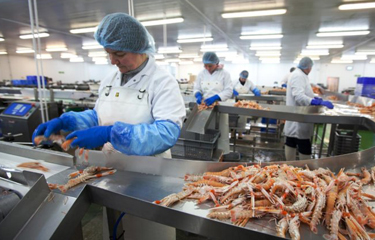Brexit has had and will continue to have a substantial impact on shellfish exports from the United Kingdom, bringing significant additional costs, but the sector needs to recognize the new landscape and adapt accordingly, according to an executive with the country’s largest shellfish processor.
Speaking at the 51st annual conference of the Shellfish Association of Great Britain (SAGB), Macduff Shellfish Director of Sustainability Public Affairs Andrew Brown said the United Kingdom’s departure from the European Union has had a much more significant impact on food and drink exports than the COVID-19 pandemic, with 81 percent of companies in the sector considered to be “not thriving” under Brexit.
Macduff, part of the Clearwater Group, focuses on scallops, crabs, whelks, and langoustines. Its main export destination for most of these products is Europe.
Brown told delegates that in 2019 – the “last normal year” of trade – the United Kingdom exported GBP 456 million (USD 642.4 million, EUR 529 million) worth of shellfish to E.U. markets, with around two-thirds accounted for by crustaceans and one-third from mollusks. In regard to the importance of the trade, the E.U. accounted for 80 percent of the United Kingdom’s total shellfish trade.
“We have a huge reliance on the E.U. markets for the vast bulk of shellfish exports. The only other players in the game of any significance are China for crabs and South Korea for whelks. We’ve got all our eggs pretty much in one basket,” he said.
Looking beyond the shellfish sector and citing Office of National Statistics (ONS) data, Brown said that food and drink exports from the U.K. to the E.U. dropped 64 percent between December 2020 and January 2021, and that January’s total was 50 percent less than in January 2020. Figures for February 2021 showed a recovery, but food and drink exports were still down 12 percent year-over-year.
According to ONS, this “quite optimistically” appears to indicate that the disruptions to exports experienced in January 2021 have largely been overcome and may have only had a short-term impact on trade, he said. However, data prepared by Seafish showed U.K. shellfish exports for the months of January and February fell by 62 percent in volume terms, or 5,662 metric tons (MT), and dropped 59 percent, or GBP 22 million (USD 31 million, EUR 25.5 million), in value.
Brown said many of the shellfish export sector’s current problems were previously foreseen by industry analysis. Some of the “low-hanging fruit” issues have since been addressed to make export systems work better, but additional paperwork requirements remained, and are something that other sectors haven’t faced. The sector has also been aided by government financial support.
“There has been quite a lot of positive work, but there is still a lot to do,” he said.
The post-Brexit dialogue between U.K. and E.U. rulemakers needs to be more constructive and stable, with both sides “rolling up their sleeves and getting on with it,” Brown said.
“The greatest change, in my opinion, is the U.K.’s overall trading position. We’re not in Kansas anymore,” he said. “The E.U. is no longer the friendly, open, free, frictionless domestic market that we used to have access to. This means that our sector is exposed to the full force of global markets. Global demand is god.”
One of the common characteristics among the 19 percent of companies that are thriving in a post-Brexit world is their ability to listen to their E.U. customers, he added.
“Our customers are telling us the following things: That they want the quantities that they asked for, they are looking for consistently high quality in product, they are looking for traceability to demonstrate that products are legal and abide by all current regulations, and they are looking for sustainability certification to demonstrate that,” he said. “We need to ensure we can meet those customers’ demands. As a sector, we need to recognize the brave new Brexit world that we live and trade in and adjust to it throughout our supply chain. This process won’t be easy. It will be challenging. It will require culture changes and it’s already happening. We can either stay on the platform and watch the train leave or we can all buy a ticket and get on."
Brown told SeafoodSource that aside from the E.U., South Korea and Vietnam offer prime opportunities for U.K. shellfish exports, as does the North American market, but that each will present trade and access difficulties.
“As much as we have struggled with the Brexit trade barriers, there are trade barriers with other countries as well, and difficulties to overcome,” he said.
Photo courtesy of Macduff Shellfish







